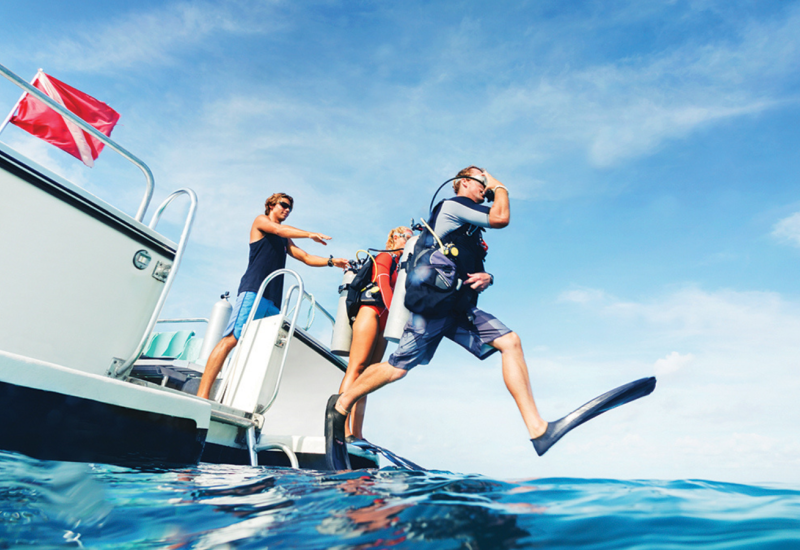Buddy Diving: Legal Liabilities
Disclaimer: This article provides a review of emerging legal issues pertaining to the responsibilities of dive buddies. It is not intended as legal advice.
Yesterday's Rules, Today's Nonsense
||
|---|
|

|
| Photo by Chris Jaffe Photography by Chris Jaffe|
Unlike dive professionals, whose duties and standards of care are spelled out by their certifying agency, buddies are often given vague, conflicting and outmoded recommendations:
-
Duty: In diving, you can establish your duty to another diver by becoming his or her instructor, divemaster or buddy.
-
Breach of duty: You can fail your duty in two ways: by not doing something you should have done, or by doing the wrong thing.
-
Proximate cause: You meet this criterion if your failure to meet your duty can be shown to have caused an accident or incident.
-
Damage: Your breach of duty not only caused an accident, but also led to harm, such as injury or death.
-
Guilty: Taking an open-water certified diver who did not have the proper training, experience or equipment into a cave, wreck or under ice.
-
Guilty: Taking an uncertified diver scuba diving.
-
Guilty: Refusing to share air with a buddy, with no compelling reason for the refusal.
-
Guilty: Taking an inexperienced certified diver into severe or extremely demanding conditions, such as heavy surf, strong current, polluted water, extreme depths or cold water without proper thermal protection.
-
Guilty: Providing false or misleading information to a buddy about personal diving experience, environmental conditions, decompression status, gas available or equipment operation.
-
Guilty: Ditching the weights of another diver when they should not have been ditched, therefore causing an air embolism, entrapment or being run down by a boat.
-
Guilty: Refusing to return the primary regulator during buddy breathing.
-
Guilty: Diving while under the influence of drugs or alcohol.
-
Guilty: Playing underwater chicken games, such as going into caves, turning off lights, seeing who can go the deepest or who can hold his breath the longest.
-
Guilty: Hitting, removing gear from another diver, holding a diver down, or otherwise sabotaging the diver's safety.
-
Communicate with each other.
-
Plan the dive together.
-
Check each other's gear.
-
Know what you are going to do if either of you has a problem.
-
Have a buddy separation procedure that you both agree to follow.
-
Pause regularly during the dive to check each other.
-
To share the experience with another diver.
-
To help each other by lending a hand with dive gear, getting in and out of the water, and so on.
-
To make a rescue, which is the least likely skill needed and, unfortunately, the skill that divers are the least capable of providing for each other. Yet this need and the ability to rescue your buddy is likely to be where most legal actions will focus.
-
Ask for a change of assignments. Do this as soon as possible to give the operator time to accommodate your wishes.
-
If you are prepared to be a solo diver and the situation allows for solo diving, consider this alternative.
"Always dive with a buddy." Solo diving is not only common, it is actively promoted in books and magazines.
"Know how to use decompression tables." Most divers use dive computers and cannot correctly work the tables.
"Do not make decompression dives." Such dives are commonplace with conservative dive computers, safety stops, slow ascent rates, extended-range and tech diving.
"Do not dive beyond 60 feet as an open-water diver or beyond 130 feet as a recreational diver." Yeah, right.
So What Rules Should You Follow?
The basic answer is: those established by good practice and later refined by the courts. A growing number of legal cases against buddies has forced courts to begin to define what a dive buddy's legal responsibilities are and when negligence of them constitutes a punishable offense. Let's take the last one first: When can you as a dive buddy be found negligent?
Fit These Four, Shut the Jailhouse Door
Four criteria are used to establish negligence in a court of law:
So What Should a Buddy Do?
The courts so far have been much better at using the concept of negligence to determine, case by case, what a diving professional should do or not do than in establishing what a buddy should or should not do. Here are some of the actions that would likely result in a buddy being found liable for harm to another diver:
Best Buddies
The characteristics of a good buddy team may not be encoded in law or a training agency's regulations, but they should be followed by anyone who makes the conscious, voluntary choice to become someone else's dive buddy. Yes, that choice has potentially negative legal ramifications, but it can also lead to safer, more enjoyable dives, if you:
You should keep in mind that your first responsibility is to yourself; all divers are taught self-sufficiency as well as self-rescue skills. Also, remember that there are three good reasons to buddy dive, in order of importance:
Lesson For Life: Just Say No
If you don't feel comfortable with the dive conditions, your buddy's plan, or the behavior of your buddy, just say no to the dive. Better not to make the dive than to become the victim of an accident or the defendant in a legal action.
I Don't Trust My Assigned Buddy--What Should I Do?
If you have been assigned a buddy by a dive operator and that buddy is not right for you:
Disclaimer: This article provides a review of emerging legal issues pertaining to the responsibilities of dive buddies. It is not intended as legal advice.
Yesterday's Rules, Today's Nonsense

Photo by Chris Jaffe Photography by Chris Jaffe Unlike dive professionals, whose duties and standards of care are spelled out by their certifying agency, buddies are often given vague, conflicting and outmoded recommendations:
"Always dive with a buddy." Solo diving is not only common, it is actively promoted in books and magazines.
"Know how to use decompression tables." Most divers use dive computers and cannot correctly work the tables.
"Do not make decompression dives." Such dives are commonplace with conservative dive computers, safety stops, slow ascent rates, extended-range and tech diving.
"Do not dive beyond 60 feet as an open-water diver or beyond 130 feet as a recreational diver." Yeah, right.
So What Rules Should You Follow?
The basic answer is: those established by good practice and later refined by the courts. A growing number of legal cases against buddies has forced courts to begin to define what a dive buddy's legal responsibilities are and when negligence of them constitutes a punishable offense. Let's take the last one first: When can you as a dive buddy be found negligent?
Fit These Four, Shut the Jailhouse Door
Four criteria are used to establish negligence in a court of law:
Duty: In diving, you can establish your duty to another diver by becoming his or her instructor, divemaster or buddy.
Breach of duty: You can fail your duty in two ways: by not doing something you should have done, or by doing the wrong thing.
Proximate cause: You meet this criterion if your failure to meet your duty can be shown to have caused an accident or incident.
Damage: Your breach of duty not only caused an accident, but also led to harm, such as injury or death.
So What Should a Buddy Do?
The courts so far have been much better at using the concept of negligence to determine, case by case, what a diving professional should do or not do than in establishing what a buddy should or should not do. Here are some of the actions that would likely result in a buddy being found liable for harm to another diver:
Guilty: Taking an open-water certified diver who did not have the proper training, experience or equipment into a cave, wreck or under ice.
Guilty: Taking an uncertified diver scuba diving.
Guilty: Refusing to share air with a buddy, with no compelling reason for the refusal.
Guilty: Taking an inexperienced certified diver into severe or extremely demanding conditions, such as heavy surf, strong current, polluted water, extreme depths or cold water without proper thermal protection.
Guilty: Providing false or misleading information to a buddy about personal diving experience, environmental conditions, decompression status, gas available or equipment operation.
Guilty: Ditching the weights of another diver when they should not have been ditched, therefore causing an air embolism, entrapment or being run down by a boat.
Guilty: Refusing to return the primary regulator during buddy breathing.
Guilty: Diving while under the influence of drugs or alcohol.
Guilty: Playing underwater chicken games, such as going into caves, turning off lights, seeing who can go the deepest or who can hold his breath the longest.
Guilty: Hitting, removing gear from another diver, holding a diver down, or otherwise sabotaging the diver's safety.
Best Buddies
The characteristics of a good buddy team may not be encoded in law or a training agency's regulations, but they should be followed by anyone who makes the conscious, voluntary choice to become someone else's dive buddy. Yes, that choice has potentially negative legal ramifications, but it can also lead to safer, more enjoyable dives, if you:
Communicate with each other.
Plan the dive together.
Check each other's gear.
Know what you are going to do if either of you has a problem.
Have a buddy separation procedure that you both agree to follow.
Pause regularly during the dive to check each other.
You should keep in mind that your first responsibility is to yourself; all divers are taught self-sufficiency as well as self-rescue skills. Also, remember that there are three good reasons to buddy dive, in order of importance:
To share the experience with another diver.
To help each other by lending a hand with dive gear, getting in and out of the water, and so on.
To make a rescue, which is the least likely skill needed and, unfortunately, the skill that divers are the least capable of providing for each other. Yet this need and the ability to rescue your buddy is likely to be where most legal actions will focus.
Lesson For Life: Just Say No
If you don't feel comfortable with the dive conditions, your buddy's plan, or the behavior of your buddy, just say no to the dive. Better not to make the dive than to become the victim of an accident or the defendant in a legal action.
I Don't Trust My Assigned Buddy--What Should I Do?
If you have been assigned a buddy by a dive operator and that buddy is not right for you:
Ask for a change of assignments. Do this as soon as possible to give the operator time to accommodate your wishes.
If you are prepared to be a solo diver and the situation allows for solo diving, consider this alternative.










